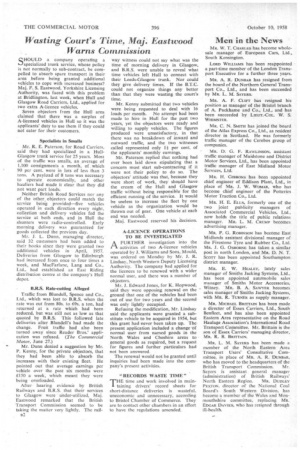Wasting Court's Time, Maj. Eastwood Warns Commission
Page 36

If you've noticed an error in this article please click here to report it so we can fix it.
QHOULD a company operating a kJ specialized trunk service, whose policy is not normally to sub-contract, be compelled to absorb spare transport in their area .before being granted additional vehicles to cope with increased business? Maj. F. S. Eastwood, Yorkshire Licensing Authority, was faced with this problem at Bridlington, last week, when Hull and Glasgow Road Carriers, Ltd., applied for two extra A-licence vehicles.
Seven objectors from the Hull area claimed that there was a surplus of A-licensed vehicles in Hull so it was the applicants' duty to use them if they could not cater for their customers.
Specialists in Smalls Mr. R. E. Paterson, for Road Carriers, said they had specialized in a HullGlasgow trunk service for 25 years. Most of the traffic was smalls, an average of 1,100 consignments a month, of which 90 per cent. were in lots of less than 3 tons. A payload of 8 tons was necessary to operate economically, and other hauliers had made it clear that they did not want part loads: Neither British Road Services nor any of the other objectors could match the service being provided—five vehicles operated in each direction every night, collection and delivery vehicles fed the service at both ends, and in Hull the shunters were radio-controlled. Early morning delivery was guaranteed for goods collected the previous day.
Mr. J. L. Dunn, managing director, said 32 customers had been added to their books since they were granted two additional vehicles in April, 1957. Deliveries from Glasgow to Edinburgh had increased from once to four times a week, and MacFarlane, Lang and Co., Ltd., had established an East Riding distribution centre at the company's Hull depot.
• B.R.S. Rate-cutting Alleged Traffic from Blundell, Spence and Co., Ltd., which was lost to B.R.S. when the rate was cut from 80s. to 69s. a ton, had returned at a rate which had been reduced, but. was still not as low as that quoted by B.R.S. This followed late deliveries after Blundell's had made the change. Fruit traffic had also been
turned away since Reader Bros.' application was refused. (The Commercial Motor, June 27.)
Mr. Dunn denied a suggestion by Mr. P. Kenny, for the private objectors, that they had been able to absorb the increases with their existing fleet. He pointed out that average earnings per vehicle over the past six months were £150 a week, which meant they were being overloaded.
After hearing evidence by British Railways and B.R.S. that their services to Glasgow were under-utilized, Maj. Eastwood remarked that the British Transport Commission seemed to be taking the matter very lightly. The rail a2 way witness could not say what was the time of morning delivery in Glasgow, and B.R.S. were unable to reveal what time vehicles left Hull to connect with their Leeds-Glasgow trunk. Nor could they give delivery times. If the B.T.C. could not organize things any better than that they were wasting the court's time.
Mr. Kenny submitted that two vehicles were being requested to deal with 16 loads per month. No attempt bad been made to hire in Hull for the past two years, yet the objectors were ready and willing to supply vehicles. The figures produced were unsatisfactory, in that there was no breakdown of inward and outward traffic, and the two witnesses called represented only 1+ per cent, of the applicants' monthly earnings.
Mr. Paterson replied that nothing had ever been laid down stipulating that a concern must start sub-contracting if it were not their policy to do so. The objectors' attitude was that, because they were short of work, they should have the cream of the Hull and Glasgow traffic without being responsible for the efficient running of the service. It would be useless to increase the fleet by one vehicle as the organization would be thrown out of gear. One vehicle at each end was needed.
Maj. Eastwood reserved his -decision.
A-LICENCE OPERATIONS TO BE INVESTIGATED
AFURTHER investigation into the activities of two A-licence vehicles operated by J. Williams and Sons, Mould, was ordered on Monday by Mr. J. R. Lindsay, North Western Deputy Licensing Authority. The company had applied for the licences to be renewed with a wider normal user, and there was a number of objectors.
Mr. J. Edward Jones, for K. Hopwood, said they were opposing renewal on the ground that one of the vehicles had been out of use for two years and the second was only lightly occupied.
Refusing the modification, Mr. Lindsay said the applicants were granted a substitute vehicle to be acquired in 1954, but this grant had never been taken up. The present application included a charige'of normal user from named goods in the North Wales and Cheshire areas to general goods as required, but a request for figures and further particulars had not been answered.
The renewal would not be granted until inquiries had been made into the company's present activities.
"RECORDS WASTE TIME" THE time and work involved in main taining drivers' record sheets for short-distance deliveries is wasteful. uneconomic and unnecessary, according to Bristol Chamber Of Commerce. They are to contact other chambers in an effort to have the regulations amended.




































































































